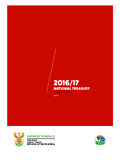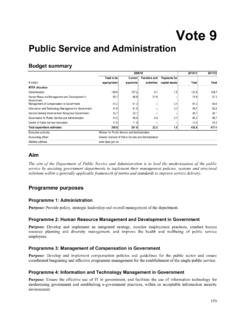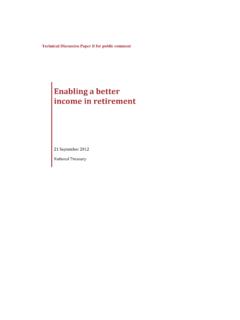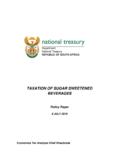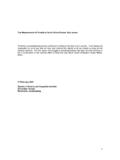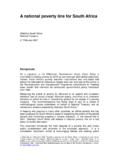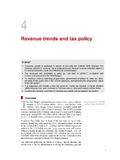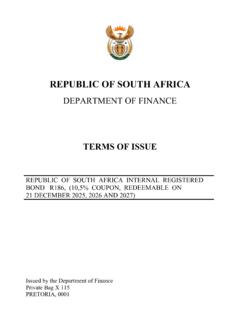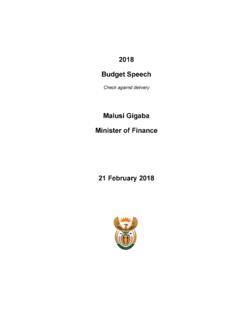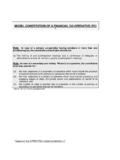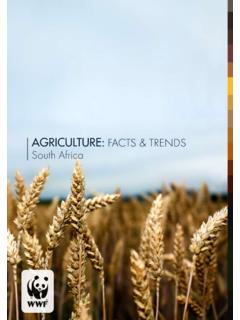Transcription of Black Economic Empowerment and economic performance in ...
1 Black Economic Empowerment and economicperformance in South Africa Daron AcemogluyStephen GelbzJames A. RobinsonxAugust 2007. We thank Mar a Alejandra Palacio for her outstanding research Institute of Technology, Department of Economics, E52-380, 50 Memorial Drive, Cambri-udge MA02142. e-mail: EDGE Institute, 11th Floor, Braamfontein Centre, 23 Jorrisen Street, Braamfontein, Johannesburgand the University of Witwartersrand, e-mail: University, Department of Government, IQSS, 1737 Cambridge St., N309, Cambridge MA02138;e-mail: Policy BriefWe lay out a conceptual framework for evaluating the impact of BEE on Economic growth,both directly through its e ects on rm behavior and indirectly through its impact on politicalstability.
2 We emphasize that because of the way the phenomena of BEE has evolved sinceits inception in 1993, the extent and form of BEE are unlikely to be optimal from the pointof view of Economic growth. This suggests that there may be possibilities for making growthenhancing priori, there are good arguments that suggest that several of the components of BEE couldhave positive and/or negative e ects on productivity and investment and hence on of these e ects are stronger is an empirical question. We use data on the BEE ratingsof companies from Empowerdex along with a dataset of companies listed on the JSE to examinethe e ects of the aggregate BEE score of a company (according to the BEE scorecard) andthe BEE Ownership score, on investment, labor productivity and pro tability.
3 The heart ofthis analysis are two rm level identi cation strategies using the allocation of the investmentportfolio of the PIC and the presence of a single shareholder with 50% or more of the equity, assources of variation in BEE across rms. Both of these variables strongly predict the extent towhich an individual rm engages in BEE, and the second plausibly predicts the BEE ownershipshare. The main result of these regressions is that so far, BEE seems to have had very littleimpact on rm behavior. If anything there is weak evidence that both BEE in general, andthe BEE ownership score, has a negative e ect on investment and labor productivity, thoughthis is not statistically signi cant at standard con dence are several possible interpretations of these ndings: (1) Data problems make infer-ence di cult to impossible.
4 (2) It is too early to empirically test for BEE s implications forthe economy, (3) The Economic costs and bene ts of BEE cancel each other out so that theaggregate e ect is zero, (4) The big issue may be the aggregate e ects (avoidance of populism)which we cannot estimate at the rm level, (5) BEE actually does not have large e ects on rm behavior though it does in uence though it is di cult to say which of these views is correct, there exists a solid basis1to make some policy recommendations on BEE. This is because it is clear that some aspects ofBEE are quite unsatisfactory and there clearly are areas where the policy needs to be clari edand amended.
5 The arguments in this paper suggest three main policy rst follows from the fact that a priori arguments suggest that while the emphasison the transfer of ownership in BEE may have been important in the decade after 1994 forprovisionally securing property rights, it is unlikely to have large positive e ects on rm pro- ductivity or Economic growth. Moreover, enduring property rights security certainly requiresa broader base than can be provided by such a policy. We therefore believe that the policyneeds to be changed to de-emphasize ownership and increase the focus on aspects of it moreclearly linked to increased productivity and the broader transformation of the economy.
6 Asimple policy to achieve this would be: The weights in the BEE Codes should be changed to downgrade ownership and increasethe importance of enterprise development and skills second clearly problematic nature of the policy at the moment is that it is both openended and there is no mechanism in place for evaluating its impact on any of the outcomesit is supposed to in uence. While industry charters set various targets for future dates, theydo not say what happens after this. This creates uncertainly in the minds of businessmen andinvestors. Though basic Economic analysis suggests that BEE ought to be only a transitorypolicy, we also note that it may not be desirable for the government to announce a terminaldate.
7 The appropriate response is to immediately create an institution that can properlyevaluate the policy by 2014 when many targets are supposed to be met and be in the positionto make a rational decision about the future of the policy. To this end a second BEE commissionought to be formed now. This leads to our second policy conclusion: Announce , to evaluate a policy properly, one must have good information about it. Thereis at the moment widespread scepticism about the existing data on the extent of compliancewith BEE. It is therefore crucial that the government creates a mechanism to establish credibledata collection. We believe there is a simple solution to Link BEE veri cation with nancial IntroductionAfter the transition from Apartheid in 1994, the government of the African National Congress(ANC) considered that the creation of greater political equality in itself, though necessary, wasnot su cient to unwind the inherited social and Economic inequalities.
8 To deal with the legacyof Apartheid, direct intervention in the distribution of assets and opportunities was deemeddesirable and the central pillar of this intervention became Black Economic Empowerment (BEE, now B-BEEE Broad-Based BEE). BEE was de ned in 2001 by the BEE Commissionas follows (BEE Commission Report, p. 2): It is an integrated and coherent socio- Economic is located within the context of the country s national transformation pro-gramme, namely the RDP (Reconstruction and Development Programme)It is aimed at redressing the imbalances of the past by seeking to substantiallyand equitably transfer and confer the ownership, management and control of SouthAfrica s nancial and Economic resources to the majority of the seeks to ensure broader and meaningful participation in the economy by blackpeople to achieve sustainable development and prosperity.
9 In essence, BEE is about attempting to create a degree of Economic equality which wouldnot itself be a natural market outcome of the changed political environment. Such a policyhas been a commitment of the ANC at least since the formulation of the Freedom Charter in1955 which stated The national wealth of our country, the heritage of South Africans, shall be re-stored to the people; The mineral wealth beneath the soil, the Banks and monopolyindustry shall be transferred to the ownership of the people as a whole; All otherindustry and trade shall be controlled to assist the wellbeing of the people; 1 Such a goal was also con rmed by Nelson Mandela after his release from prison and duringhis rst public address to South African big business in May 19901 it is quite obvious that the Economic power relations represented by the exces-sive concentration of power in a few white hands have to change.
10 One of SouthAfrica s imperatives is to end white domination in all its forms, to deracialise theexercise of Economic power .In this paper we provide a preliminary analysis of BEE with a particular eye on the impactof the policy on rm behavior and performance and Economic growth. In section II of thepaper we give an overview of the history and phases of BEE (and B-BBEE) and discuss howthe policy operates at the moment. In section III we address the question of the relationshipbetween BEE and Economic growth. We analyze what sorts of problems BEE has been designedto solve and whether there exist other instruments which could have been used to achieve thesame aim.
